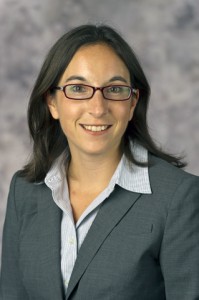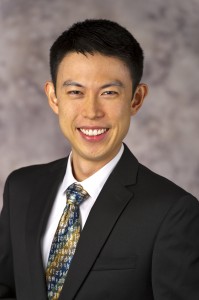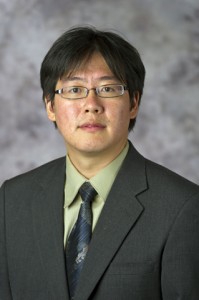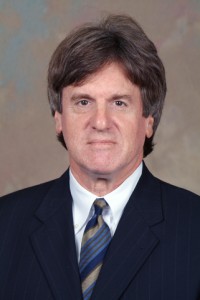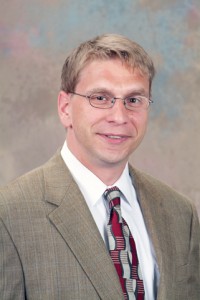The John Marshall Law School is welcoming five new professors to its faculty.
Professors Margaret Kwoka, Daryl Lim and Benjamin Liu are new to the law school faculty. Professors Marc Ginsberg and Scott Shepard, who have been teaching at the law school the past two years, are moving from visiting professor to assistant professor rank.
“We are delighted to welcome them to our law school,” said Dean John E. Corkery. “As a group, they bring to us unique backgrounds in law practice, law teaching, and public service. They will enrich our curriculum and contribute to classroom teaching and scholarship.”
Kwoka is coming to John Marshall after completing a one year clerkship with Judge Michael Murphy of the U.S. Court of Appeals for the Tenth Circuit. She also has clerked for Chief Justice Phillip Rapoza at the Massachusetts Appeals Court.
At John Marshall, Kwoka will be teaching Civil Procedure and Administrative Law. She has been a lecturer at George Washington University School of Law co-teaching a Public Interest Lawyering seminar; an attorney with the Public Citizen Litigation Group in Washington, D.C. as an Equal Justice Works Fellow; and the associate mentor for law and policy with the Jack Kent Cooke Foundation working directly with three high-achieving, low-income high school students interested in career in law and policy.
After receiving a bachelor’s degree in biology from Brown University, she served with the Peace Corps in West Africa. She received a law degree from Northeastern University School of Law. As a law student, she received the Outstanding Graduate Student Award; served as a research assistant in International Human Rights Law, and co-wrote a petition for certiorari to the U.S. Supreme Court on a death penalty case.
Lim was the Inaugural Microsoft Teaching and Research Fellow at the Fordham University School of Law where he taught European Union IP Law, Patent Law and Copyright Law. At John Marshall, his courses will include Patent and Trade Secret Law, Advanced Patent Law and the IP-Antitrust interface.
He was an associate at both the litigation as well as the IP and technology groups at Allen & Gledhill LLP, Singapore’s largest law firm. Lim was an intern with Chief Judge Randall R. Rader at the Court of Appeals for the Federal Circuit, and for Commissioner William E. Kovacic at the Federal Trade Commission. He also was a researcher at the Max Planck Institute for IP and Competition Law in Munich, and at Queen Mary Intellectual Property Law Institute in London.
Lim has graduate law degrees from Stanford University and the National University of Singapore (NUS). He received an undergraduate degree in law and economics from NUS, and in economics and management from the London School of Economics and Political Science. At Stanford, he received the Franklin Family Fellowship and was awarded the Ewing Marion Kauffman Foundation Research Grant.
His articles have been published in leading IP law reviews and books in the U.S., Europe and Asia. Lim’s forthcoming book, Patent Misuse: An Empirical Study, will be published by Edward Elgar Publishing. In 2009, he received the Grand Prize in the International Association for the Advancement of Teaching and Research in IP’s International Essay Writing Competition which formed the basis of the lead articles in the forthcoming issue of IDEA: The IP Law Review. His current writing projects include co-authoring the patent and IP-antitrust sections of an IP casebook to be published by West Publishing in 2012.
Liu is serving as the director of the Chinese Intellectual Property Resource Center at The John Marshall Law School. He will be designing academic programs that will be hosted by the Center. He has been practicing IP law since 2004, first with Stroock & Stroock & Lavan LLP in New York, and then as an IP attorney in private practice in Chicago. Liu has represented Asian and American clients in patent litigation, prosecution and consulting and his research focuses on comparative IP issues and biotech IP protection. At the law school, he will teach IP specialty courses, including Administrative IP Protection at the US Border and Comparative Topics in U.S.-China Patent Law.
After receiving a bachelor’s degree from Harvard University in biochemistry and cellular biology, Liu conducted drug discovery research at Eli Lilly & Co. for two years. He then studied Japanese at Waseda University in Tokyo before attending UCLA School of Law, receiving a JD degree in 2004. He was the articles editor for the UCLA Law Review, and chief articles editor for the Pacific Basin Law Journal. He has published a study of IP protection for traditional medicine and contributed articles in Genetic Engineering & Biotechnological News, and Intellectual Property Today, in addition to presenting his research on pharmaceutical IP protection in China at pharmaceutical conferences.
Ginsberg joined the faculty in 2009 as a visiting professor after 30 years in private practice, and more than 15 years as a John Marshall adjunct faculty member. In fall 2011, he will be teaching Evidence and Civil Procedure. He has been instrumental in the 2011 establishment of a JD certificate program in Health Law.
Ginsberg’s most recent articles are “At Long Last, A Long Look At Respondents In Discovery” to be published by the Southern Illinois University Law Journal and “Informed Consent: No Longer Just What The Doctor Ordered? The ‘Contributions’ Of Medical Associations And Courts To A More Patient Friendly Doctrine,” published in the Michigan State University Journal Of Medicine And Law.
Ginsberg practiced with Rooks Pitts and its successor firm, Dykema Gossett PLLC, as a litigation partner in Chicago concentrating in trial and appellate cases, primarily in defense of physicians in medical litigation and litigation.
Ginsberg received a BA degree with honors from the University of Illinois at Chicago; an MA degree from Indiana University; a JD degree with highest distinction from The John Marshall Law School; and an LLM in Health Law from DePaul University College of Law.
Before coming to John Marshall, Shepard was a visiting professor at Wake Forest University School of Law in the 2008-2009 academic year, and the Olin/Searle Fellow resident at Vanderbilt University Law School for the 2007-2008 academic year.
Shepard was a law clerk for Judge Jerry E. Smith in the U.S. Circuit Court of Appeals for the Fifth Circuit before going to work at the Washington, D.C., firms of Wilmer, Cutler & Pickering and Ropes & Gray. In 2004, he joined the Office for Civil Rights at the U.S. Department of Education, where he was an attorney advisor.
Shepard moved to Sacramento, Calif., to serve as managing attorney for the Pacific Legal Foundation, where he managed and developed the Western Water Law Project, working toward preserving private-property water rights. He litigated in state and federal courts and publicly defended issues of property, environmental and personal liberty law.
Shepard’s primary area of research is property law, especially the relative efficacy of the various legal systems of property management. His article “Adverse Possession, Private-Zoning Waiver & Desuetude: Abandonment & Recapture of Liberty and Property Interests” was recently published by the University of Michigan Journal of Law Reform, and he discussed “Which the Deader Hand? A Counter to the ALI’s Proposed Revival of Dying Perpetuities Rules” as a presenter at the 2010 Central States Law Schools Association Conference.
Shepard received a BA degree from the University of Richmond, an MA degree from Vanderbilt University, and a JD degree with Order of the Coif from the University of Virginia School of Law. In the 2011-2012 academic year, he will be teaching Property, Natural Resources and Estates and Trusts.

